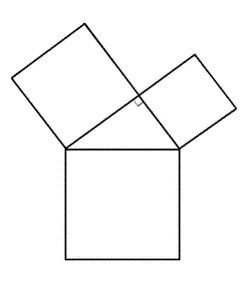 Math was never my forte, but I've always loved it! I recently sat in on Dr. Josh Barnard's context lecture on the Pythagorean Theorem. While I understand in principle the rules behind a 3-4-5 right triangle, I found myself struggling to keep up. But it was not for lack of interest! In fact, the content was fascinating. As much a nod to historical cultures as to the theorem itself, Dr. Barnard traced the history of the Theorem from Babylon, to China and India, with only a cursory nod to Pythagoras and the Greeks. While not dismissive of Greek contributions to the discipline, Dr. Barnard illustrated how other cultures were grappling with the concept, for various purposes, before and alongside the Greeks. It seems these disparate cultures displayed some functional knowledge of the Theorem. Whether they understood proofs or not is up for debate. It is known, however, that the Babylonians, consummate record keepers, used the Theorem in their book keeping. The Chinese utilized it as a tool in their quest to come up with "...general methods of solving problems." And the Indians were applying it "...to a whole range of practical problems." The takeaway? The Pythagorean Theorem, the concept that we all had to learn to survive geometry, figures prominently into the cultural experiences and daily survival of ancient civilizations. We often assume that culture is the purview of aesthetics and art. But if culture is humanity organizing, shaping, and interpreting the natural world, then mathematics and the sciences are absolutely cultural exemplars.
0 Comments
Leave a Reply. |
Archives
February 2016
Categories |
 RSS Feed
RSS Feed
